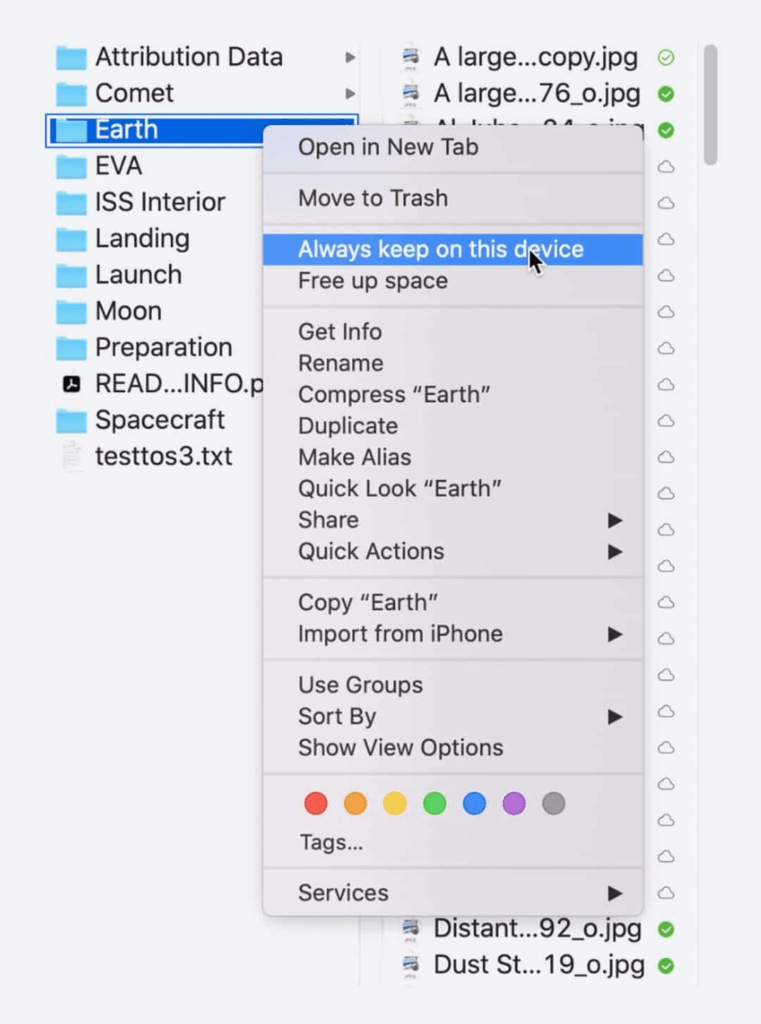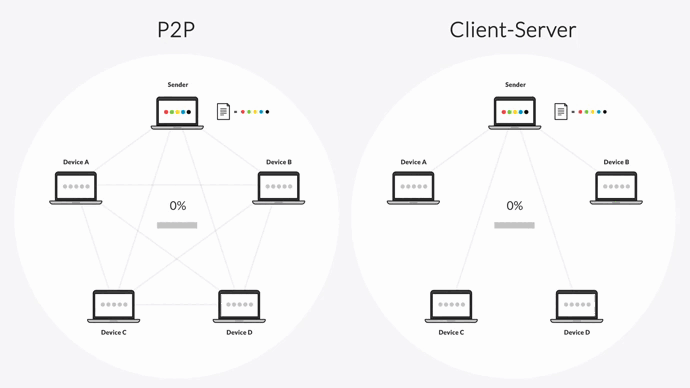While Amazon offers a proprietary file gateway, their solution falls short in several business use cases. In addition to being limited to use with only the Amazon Web Services cloud, Amazon’s S3 file gateway lacks the flexibility (i.e., granular control over how files are synchronized and stored locally or in the cloud), efficiency (i.e., features that help organizations further optimize cloud costs), and reliability that some organizations need in a cloud storage gateway solution.
Resilio Connect, our file synchronization software, offers a superior AWS storage gateway alternative for organizations that need to extend their on premises storage to the cloud (particularly for those using other cloud storage platforms or multi-cloud storage and for remote work and hybrid/multi-cloud disaster recovery use cases).
Resilio Platform provides efficient file caching and low-latency access to data stored on AWS cloud storage (or any other cloud provider) from any remote office or data center. It transforms your on-prem servers and NAS devices into flexible, efficient storage gateways by enabling you to remotely browse and selectively sync file shares stored on AWS and on-prem servers.
Please get in touch with us to schedule a demo or feel free to read on.
Resilio’s file gateway solution provides a file interface to object storage and includes features that make it well suited to caching and synchronizing large datasets between any cloud object storage (such as Amazon S3, Backblaze, Wasabi, Azure Blobs, and more) and your on-premises facilities, such as:
1. Highly Efficient and Cost-Effective File Access
As an agent-based, software-only solution, Resilio can be easily deployed on your existing IT infrastructure and Windows file servers, hypervisors, and virtual machines.
It enables organizations to extend their on-premises environment to the cloud while providing full control over how data is accessed, cached, and synchronized — ultimately reducing many of the costs associated with cloud data storage, such as cloud egress traffic.
2. Flexibility & Vendor-Agnosticism
Resilio is a vendor-agnostic solution that is designed to easily integrate with your existing cloud and on-premises applications. You can manage all of your on-prem and cloud storage from a single, unified interface, and tailor how data is synchronized and accessed in order to optimize your organization’s specific workflow.
3. Highly Reliable and Resilient
Resilio’s P2P (peer-to-peer) transfer architecture and proprietary WAN acceleration technology ensure that your replication environment has no single point of failure. You can transfer data over any network (no matter how unreliable) and sync data quickly in any direction.
4. End-to-End Security
While data security is always imperative, it becomes even more important when storing data in the cloud. Resilio Platform includes built-in security features that protects data end-to-end and ensures data integrity.
In this post, we’ll dive more into how these features solve critical business pain points for our customers, then answer some frequently asked questions about S3 file gateways.
Organizations in gaming (Blizzard, Wargaming.net), media (Warner Brothers, CBS), tech (Microsoft, Match.com), retail (McDonalds, Mercedes Benz) and more use Resilio Platform for fast, distributed hybrid cloud storage. To learn more about using Resilio Platform as an S3 file gateway, schedule a demo.
Highly-Efficient, Cost-Effective Access to Your Files
Storing data in the cloud is a cost-effective way to increase data availability for business operations and disaster recovery, as well as to support remote work and collaboration among distributed teams. But most cloud storage solutions don’t have efficient ways of ingesting and replicating data, and cloud costs are unnecessarily increased by vendor lock-in, cloud egress fees, and the need for multiple solutions to manage and secure your data.
Resilio Platform makes hybrid cloud and multi-cloud storage more affordable by providing a seamless and efficient way to combine on-prem storage with long-term cloud object storage, freeing up space on your on-prem servers.
Storing data on multiple cloud storage services is an intelligent way to maintain high availability of data and business continuity. But it also requires organizations to use multiple file gateways to access and transfer their data. Resilio Connect, however, is a software-only, vendor-agnostic solution that requires no proprietary hardware and works with any type of on-prem or cloud object storage — enabling organizations to deploy it on their existing IT infrastructure at low cost and manage everything from one, unified interface.
Resilio Connect’s peer-to-peer transfer architecture means that every server in your environment can take part in replication, fully utilizing your entire bandwidth, so you can quickly synchronize data without compromising availability or performance.
By using Resilio’s Management Console, you can reduce cloud egress fees/traffic by controlling:
- Selective synchronization: Determine which files get synchronized to which endpoints.
- Local caches: Determine which files are cached locally on your on-prem servers (so you can store frequently accessed files locally and keep infrequently accessed files in long-term cloud storage).
- Selective downloads: You can download or partially download only the files/portions of files that you need.
End-users can easily view, retrieve, and access files stored in the cloud (as they normally would from an on-prem server) via SMB (Server Message Block) or NFS (Network File System), all from one unified interface that operates much like Microsoft OneDrive.

Resilio Platform also includes native security features that eliminate the need for purchasing 3rd-party security software and VPNs (more on this later).
Case Study: Mercedes Benz
Mercedes Benz uses Resilio Platform to synchronize data between 40 dealerships in Europe.
“If we bought about 40 additional servers, it would have been pretty expensive. Resilio is a much cheaper solution for us right now.”
Learn more about how Resilio Platform helps Mercedes Benz to cost-effectively manage their data.
Flexibility and Vendor-Agnosticism
Resilio Platform was built on open standards, open file formats, and an open, multi-cloud architecture. While much of this was discussed in the previous section, it’s worth reiterating that Resilio’s flexibility enables it to work with:
- The existing IT infrastructure that your team is already using — i.e., networks, servers, desktops, SAN storage volumes, DAS, and NAS storage (such as QNAP, Synology, OSNexus, TrueNAS, and more) — and enterprise storage devices (such as hard drives, storage systems, NAS devices, and SSDs).
- Popular operating systems such as Windows, Mac, Linux, Android and more.
- Hypervisors, VMware, Citrix, and other virtual machines.
- Any S3-compatible cloud storage, such as AWS, Azure, Google Cloud Platform, Wasabi, Backblaze, and more.
This kind of flexibility makes Resilio Platform a highly-convenient and cost-effective solution to deploy. And it enables you to easily manage your entire on-prem and cloud storage environment from one, centralized location.
Using Resilio’s Management Console, you can optimize performance and control costs across your entire system by:
- Managing every server in your replication environment, and managing up to 50,000 agents per console.
- Receiving insight into the status of individual replication jobs, a history of all executed jobs, and real-time performance metrics (you can also configure automatic notifications that get sent to email or webhooks).
- Establishing job priorities (i.e., which files should transfer first).
- Creating profiles for each endpoint that control bandwidth allocation (for example, you can control how much bandwidth is allocated to any server during certain times of the day and on certain days of the week).
- Using Resilio’s REST API to script any type of functionality, automate replication, and integrate solutions.
Resilio Connect’s transparent selective sync, cache, and download capabilities also make it more flexible than competing file gateways, enabling you to tailor how data is stored, transferred, and accessed in order to optimize operational workflows.
Highly Reliable, Resilient Sync and Access
While optimizing storage space and costs is one of the primary concerns for IT teams, ensuring data is always synchronized and accessible is critical.
Legacy solutions, like AWS S3 file gateway, use inefficient and unreliable point-to-point architectures to transfer data. Within this transfer methodology, data is transferred via either:
- Hub-and-spoke transfer: Data must first get sent to a hub server, which then replicates the data to the other servers in your environment. This unnecessarily increases sync time and creates a single point of failure that can disrupt data replication.
- Follow-the-sun transfer: Data is replicated from one server to another sequentially — once again, creating a single point of failure.
But Resilio Connect’s peer-to-peer replication topology enables every server to take part in replication, increasing both the speed and reliability of synchronization.
When replicating files, Resilio uses a process known as file chunking to break the file down into several pieces that can transfer independently from each other. Every server in your environment can then work together to quickly synchronize the file across your entire system.
For example, Server 1 can share a file chunk with Server 2. Server 2 can immediately share that file chunk with Server 3, even before it receives the rest of the file. With every server working together, full synchronization can be achieved 3-10x faster than with traditional solutions.

To see how much time Resilio can save you, try our transfer speed calculator.
P2P replication also means that there is no single point of failure in your system. If one server or network goes down, Resilio can dynamically reroute to the nearest available server/gateway — ensuring data is always synchronized and accessible. And as your replication environment grows (i.e., more endpoints), Resilio’s sync speed only increases, as more demand (i.e., endpoints) inherently creates more supply (i.e., bandwidth, CPU, etc.).
Resilio’s reliability is further enhanced by its proprietary, UDP-based WAN acceleration protocol, Zero Gravity Transport™ (ZGT).
WAN networks suffer from high-latency and varying degrees of packet loss. And organizations operating in remote work scenarios must often use unreliable, consumer-grade networks.
ZGT optimizes transfer over WAN and low-grade networks by using:
- A congestion control algorithm that constantly calculates and optimizes the rate of data transfer based on network conditions.
- Interval acknowledgements — i.e., acknowledging packet receipt in groups just once per RTT, rather than acknowledging every packet.
- Delayed retransmission — i.e., resending lost packets in groups once per RTT.
Case Study: Data Protection Company
A global data protection company uses Resilio Platform to manage file delivery in their hybrid cloud environment.
“Our file recovery times were substantially decreased with Resilio. Our recovery time took 3 or 4 days using DFSR and we could not meet our RTOs. Using Resilio Connect, we can restore a single file — in some cases, in less than a minute — using the exact same IT infrastructure (servers, storage, and DFS namespace).”
Learn more about how Resilio Platform helped them reduce time to global file delivery and access.
Native End-to-End Security
Keeping your data safe from corruption and malicious activity is paramount, particularly when storing data in the public cloud. Many file gateway solutions come with limited security features, and force you to rely on 3rd-party security software and VPNs.
But Resilio Platform includes native, state-of-the-art security features that were reviewed by 3rd-party security experts, such as:
- End-to-end data encryption: Resilio encrypts data at rest and in transit via AES 256.
- Integrity validation: Resilio uses cryptographic data integrity validation to ensure that your data always arrives intact and uncorrupted.
- Permission controls: You can control who has access to which files, replication jobs, and endpoints.
- Mutual authentication: Before initiating any transfer with a Resilio agent (i.e., endpoint), Resilio’s Management Console ensures that the agent provides a valid token — so your data is only delivered to designated, approved endpoints.
- Forward secrecy: Resilio uses one-time session encryption keys to protect all transfers between Resilio agents.
Use Resilio’s File Gateway for Multi-Cloud and Hybrid Storage
In summary, Resilio Platform is a file synchronization software system that provides a file gateway for data stored in any type of S3 storage.
It’s a superior alternative to AWS s3 file gateway and other competing gateway solutions because it provides:
- Efficient and cost effective access to files: Resilio can be deployed on your existing IT infrastructure (minimizing deployment costs), enables you to manage your entire hybrid storage environment from one location, and enables you to minimize cloud storage and data transfer costs by controlling how data is stored, synchronized, and accessed.
- Flexibility: Resilio supports any type of on-prem storage and cloud storage provider. And Resilio’s Management Console enables you to tailor replication and data access to suit your business in order to optimize operational workloads.
- Reliable, resilient synchronization: Resilio’s P2P transfer architecture means there is no single point of failure and data can be synchronized 3-10x faster than competing solutions. And its WAN optimization technology enables you to reliably transfer data over any network.
- Native security: Resilio’s built-in, state-of-the-art security enables you to protect your data without having to invest in 3rd-party security tools and VPNs.
To learn more about using Resilio Platform as an S3 file gateway, schedule a demo.
Frequently Asked Questions
What is S3 File Gateway?
S3 File Gateway refers to Amazon’s proprietary file gateway solution for accessing data stored as objects in Amazon S3 (Amazon Simple Storage Service) and on-premises data.
It’s one of several AWS services in Amazon Storage Gateway, which also includes tape gateway (for backing up data to virtual tapes on AWS) and volume gateway (for storing cloud-backed iSCSI block storage volumes to your on-premises applications).
What is Required to Use Amazon S3 File Gateway?
In order to use the Amazon S3 file gateway, you must first:
- Configure Microsoft Active Directory.
- Ensure there is a minimum of 100 Mbps of bandwidth between the gateway and AWS.
- Configure your networking (either private, VPN, or AWS Direct Connect) between Amazon VPC (virtual private cloud) and your on-premises environment.
- Use the AWS Management Console to ensure that your gateway can resolve the name of your Active Directory Domain Controller.
For more info about configuration and hardware requirements, visit the AWS Storage Gateway website.
How Does S3 File Gateway Work?
AWS S3 File Gateway provides a file gateway that integrates to existing applications using file protocols such as NFS and SMB. It is deployed onto on-prem servers as a virtual machine (operating on Microsoft Hyper-V, VMware ESXi or Linux Kernel-based Virtual Machine [KVM] hypervisor).
AWS S3 provides access to files or file share mount points stored as objects in S3, and enables you to:
- Store and retrieve files directly using NFS (version 3 or 4.1) or SMB (version 2 and 3)
- Access your data stores in AWS S3 using any AWS Cloud application
- Manage your data using cross-region replication, lifecycle policies, and versioning.
How Do You Know When S3 File Gateway is the Right Solution for Your Business?
Storing your data in multiple clouds is an intelligent way to maximize data protection and maintain business continuity. But if you’re only storing data in the AWS Cloud and don’t need a solution with the kind of flexibility that Resilio Platform can provide (i.e., selective synchronization, partial downloads, cloud vendor-agnosticism, etc.), then AWS S3 file gateway is a suitable solution.





